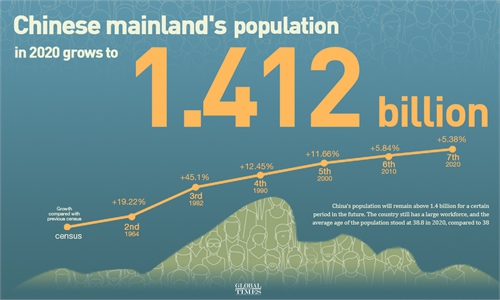Calls mount to lift family planning policy after census reports low population growth, deepening aging problem

Photo: VCG
Calls to adjust population policies such as removing the decades-long family planning policy mounted among some demographers on Tuesday, after the country released its once-a-decade population census results, which showed that the Chinese mainland's population is growing more slowly and the aging population is expanding.
Chinese demographers said that the seventh population census results were released as China's population development entered a critical turning point with a rapidly aging population and a five-decade trend of population growth was about to end, and will provide an important reference for China's population and economic policy adjustment as well as plans to raise the retirement age, which may come in a year or two.
The Chinese mainland population grew to 1.412 billion in 2020, up from 1.4 billion at the end of 2019. From 2010 to 2020, the Chinese mainland's population grew 72.06 million, or 5.38 percent, compared with the 1.34 billion recorded in the previous census (from 2000 to 2010) conducted a decade ago.
Chinese demographers said that although China reported population growth in 2020, the general declining trend was inevitable. Some demographers said China's population is likely to start to decline by 2027, but some put it as early as 2022.
He Yafu, an independent demographer, told the Global Times that there is no doubt that China will fully lift family planning policy in the near future to cope with the declining birth rate, and China is likely to remove its family planning policy as early as this autumn during the sixth plenary session of the 19th Central Committee of the Communist Party of China (CPC).
Lu Jiehua, a professor of sociology at Peking University, told the Global Times on Tuesday that China's population structure has been changing since the fifth population census in 2000, and we need comprehensive social policies to cope with the new population development paths.
"Among those policies, further improving or lifting the family planning policy was at the top of the policy list," Lu said.
He said that other policies such as raising the retirement age and speeding up establishment of a service system for elderly people as well as lowering child-raising costs need to be introduced.
Fully lifting the family planning policy will not be enough to avert a fall in China's total population, or prevent China from becoming another Japan, demographers said, noting that China should come up with more measures to encourage childbirth, such as subsidizing couples who choose to have more than one child.
Peking University professor Liang Jianzhang's advice to reward a million yuan ($155,499) to each newborn sparked wide discussions online, and the hashtag made the most searched topic list on Weibo on Tuesday night.
Liang said that to raise China's fertility rate to the replacement level of 2.1 from current 1.3, China needs to spend 10 percent of its GDP to encourage births.
China's GDP was around 100 trillion yuan, and the government needs to reward 1 million yuan for each newborn if China wants to have 10 million extra newborns every year, Liang said, adding that this reward could be in the form of cash, subsidy in purchasing a home or a deduction in social insurance.

